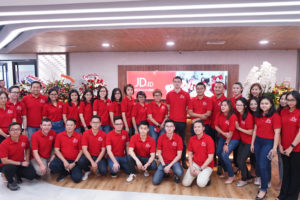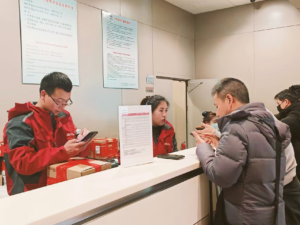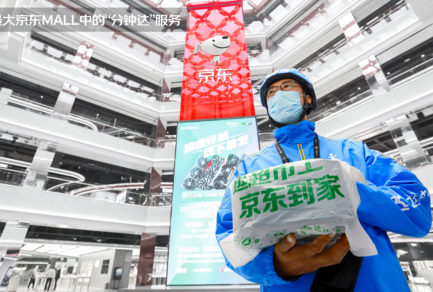Mar 25, 2020|
In-Depth Report: JD.ID CEO Zhang Li: Eyeing Sustainable, Trust-Oriented Growth in Indonesia
by Martin Li
It took four years for JD.ID, to extend its delivery service to over 90 percent of the 34 provinces in Indonesia via its logistics network, which is composed of over 69,000 square meters of warehouses and over 16,000 square meters of sorting facilities.
JD.ID is an e-commerce joint venture of China’s largest retailer JD.com, in partnership with Gojek and Provident Capital.
JD.ID has already achieved same-or-next-day delivery for over 85 percent of its orders throughout the country – an impressive achievement in a country of over 17,000 scattered islands. Customers’ satisfaction rate with delivery timeliness for products sold on the company’s direct-to-consumer platform has reached almost 99 percent.
“Only by storing products as close to customers as possible can we ensure fast delivery,” said Zhang Li, CEO of JD.ID and VP of JD.com.
 Milestones in the past four years of JD.ID.
Milestones in the past four years of JD.ID.
Zhang has been working with JD.com for ten years and was tasked to head JD.ID for its trial operations in 2015. JD.ID started official operations on March 28, 2016.
“We will continue our efforts in developing our logistics infrastructure to bring better delivery service to customers in Indonesia, “said Zhang.
“At JD.ID, we focus on three things,” said Zhang. “Delivering trust to consumers through authentic products and fast delivery, providing service to corporate clients with our advanced logistics capabilities and technologies, and developing technology-driven omnichannel experiences in Indonesia.”
Share core values of JD.com
It was during the Chinese Spring Festival that COVID-19 started having its impact felt in Indonesia. In the most populous country in Southeast Asia, people frantically rushed to buy face masks and other medical supplies.
The huge demand for face masks led to a short supply and price hikes as high as ten times the original price. However, in its commitment to the health and safety of its consumers, JD.ID supplied 10 million face masks to the local market through its direct-to-consumer e-commerce platform without increasing prices. The masks were sold out within just two weeks.
“This differentiates us in the current situation,” said Zhang.

JD.ID opened its new office in central Jakarta in November, 2019.
On March 19, Zhang sent out an open letter via social media today, pledging to prioritize supply of daily necessities which are in high demand in Indonesia, as COVID-19 becomes increasingly challenging.
“We understand the concern and anxiety over food supply, daily needs and sanitation products. With this in mind, JD.ID will continue to focus on prioritizing the restocking and delivery of essential products that are most in demand and in need. Our supply chain and logistics arms are now more vigilant than ever in ensuring goods are delivered to your home as fast as possible,” Zhang said in the letter.
The ability to ensure critical supply is just one outcome of JD.ID’s commitment to seek sustainable and trust-oriented growth in Indonesia over the past four years.
Instead of burning money to pursue short-term sales and traffic – a common practice in the region’s hot e-commerce market, JD.ID is taking a different and lower profile path to growth, fixating on building and consolidating a foundation for trust grounded in supply of authentic products and in-house logistics.
In Zhang’s eyes, JD.ID shares the core value of JD.com: trust. Headquartered in Beijing, China, JD.com had over 362 million active customers by the end of 2019 and is widely recognized for its authentic and quality products, and fast delivery. JD.com was one of the few companies in China to maintain daily delivery to consumers during the COVID-19 outbreak in China.
Commitment to authentic products
The company’s commitment to “Dijamin Ori,” which means “authentic products” in Indonesian, has been receiving increasing recognition and popularity among Indonesians. A combination of a direct-to-consumer platform as the pillar and a marketplace for third-party merchants who share a commitment to authenticity, JD.ID witnessed 33 times growth in the number of customers who placed orders in 2019, compared with that of 2016. Today, there are more than 30,000 merchants on JD.ID.
Among the most popular products for JD.ID users are electronics such as smartphones and tablets, home appliances, food and health products, and maternal and baby products.
During the Singles Day (also referred to as “Double 11”) shopping festival on Nov. 11th last year, the company witnessed an increase in daily active users of over 93 percent YoY. The most popular categories were grocery, health care products, electronic gadgets like mobile phones, and home appliances.
“Our platform has become a popular shopping destination for people who attach great importance to product quality,” said Zhang.

JD.ID X , an AI experience store, opened in PIK Avenue, North Jakarta, in 2018.
Around 60 percent of the people who make purchases on JD.ID are below age 35. This reflects a growing trend among young people who care about quality and service in Indonesia, according to analysis done by the JD Big Data Research Institute in Beijing.
“Many Chinese and Indonesian brands choose JD.ID because they share the company’s commitment to authentic products. These brands don’t want to associate with low-quality and even counterfeit products,” said Zhang.
Renowned Chinese smartphone brands, including Huawei, Xiaomi, OPPO and Vivo, started to see growth on JD.ID from 2017. Last year, 33 percent of the smartphone sales on the platform went to the Chinese brands.
“Sticking to authentic products may cost the company some short-term benefits in a fast-growing market, but it’s worth committing to it, because this will bring long term value to customers and the whole industry,” said Zhang.
There were 152 million Internet users in Indonesia by the end of 2019, according to e-Conomy SEA 2019 by Google and Temasek. The gross merchandise volume (GMV) of the e-commerce industry in the country is forecasted to reach US$82 billion in 2025, ahead of all other countries in the region.
In-house logistics
JD.ID’s determination to build in-house logistics originated from JD.com, which is able to deliver 90 percent of its orders same-or next-day in China thanks to the company’s self-operated and tech-driven logistics network. JD.com’s logistics network is composed of 700 warehouses totaling 16.9 million square meters and covers 99 percent of China’s population
Asked whether self-built logistics in island-scattered Indonesia means high costs, Zhang said, “We eye long-term value for customers and the industry.”
Once a big challenge to e-commerce in the region, logistics has turned into a business opportunity for established players. This points to the entrepreneurialism of the Southeast Asian Internet economy: when problems arise, companies find solutions to address them, generating new revenue sources, according to e-Conomy SEA 2019.
While developing its own logistics strength, JD.ID also sought to improve its delivery service via strategic partnerships in the region. The company has partnered with Gojek on J-Express(JX), a last-mile delivery logistics joint venture.
Partner trust
Last year, JD.ID started providing warehousing service to leading multi-national company IKEA in Indonesia. In addition to IKEA, companies like Mitsubishi, Mr. DIY and KK Indonesia are using JD.ID’s warehousing and delivery services.
“When a foreign consumer brand enters Indonesia, it would be a huge cost to build its own logistics infrastructure. They need a partner who is both knowledgeable about the local market and has the related strengths… With self-owned and operated warehouses and a mature logistics system born from the retail scenario, JD.ID is a natural choice, “said Zhang.
The number of enterprises approaching JD.ID for potential warehousing cooperation is on the rise, and is the result of the company’s commitment to authentic products, according to Zhang.
“The reputation as an authentic product supplier among consumers is also recognized by enterprise partners. Combined with our strength in procurement, warehousing and delivery, it is natural for them to trust us to do the job, “said Zhang.
Zhang said the increasing popularity of JD.ID with enterprise partners has further strengthened the company’s commitment to delivering trust.

JD.ID piloted its first drone delivery in Indonesia in 2019.
Looking ahead
Looking ahead, Zhang said that JD.ID will seek to create sustainable value for customers in Indonesia by ‘building muscle’ in supply chain, warehousing and logistics, omnichannel technology and talent development. “The process of building the company’s muscles is also a process of talent growth,” said Zhang.
There are four key factors for the development of e-commerce in Indonesia: payment, supply chain, inventory-related technology and talent, according to Zhang.
On the technology front, “JD.ID will continue bring innovative retail technology to Indonesia, integrating it with local demands,” Zhang said.
Indonesia is home to JD.ID X, an AI experience store built by the company. It is located on PIK Avenue in North Jakarta and is close to the Jakarta Soekarno-Hatta International Airport. JD.ID also piloted its first drone delivery in the country last year.
“While giving better service to customers by means of technology, JD.ID will also seek to enable local SMEs with its technology,” said Zhang.
Talking about himself, Zhang said that he has developed quickly with JD.ID in the past four years.
“Looking ahead, I long for continued growth with the company and our 1,200 employees,” he said. Ninety-five percent of the employees at JD.ID are Indonesian. The average is 33 years old.
“At JD.ID, we set targets for young people and encourage them to explore. Young people are trusted and encouraged to seek innovative ways to solve problems,” said Zhang.
Zhang recalled that he himself received tremendous trust and support from JD.com. He was tasked to manage procurement and sales of a variety of product categories during his time with JD.com in China, including electronics, food and fresh products. These experiences equipped him well to brace for challenges in a foreign market.





 This Harbin tourism boom has also spurred a surge in sales of winter apparel. JD.com’s data indicates a rapid growth in the sales of warm clothing items such as down jackets, snow boots, and thermal underwear between January 1st and 7th. The sales growth is especially pronounced in southern provinces and cities such as Jiangsu, Zhejiang, Guangdong, Sichuan, and Shanghai. Notably, tall snow boots registered a 206% year-on-year increase in transactions, while padded cotton caps and thickened long down jackets soared by 158% and 134%, respectively. Beyond clothing, travel gear has also seen a considerable uptick, with a 98% year-on-year growth in transactions for large suitcases and travel backpacks in these southern regions.
This Harbin tourism boom has also spurred a surge in sales of winter apparel. JD.com’s data indicates a rapid growth in the sales of warm clothing items such as down jackets, snow boots, and thermal underwear between January 1st and 7th. The sales growth is especially pronounced in southern provinces and cities such as Jiangsu, Zhejiang, Guangdong, Sichuan, and Shanghai. Notably, tall snow boots registered a 206% year-on-year increase in transactions, while padded cotton caps and thickened long down jackets soared by 158% and 134%, respectively. Beyond clothing, travel gear has also seen a considerable uptick, with a 98% year-on-year growth in transactions for large suitcases and travel backpacks in these southern regions. JD Big Data: New Type of Work Resumption; New Consumption of Telecommuting Supplies and Electric Lunch Boxes
JD Big Data: New Type of Work Resumption; New Consumption of Telecommuting Supplies and Electric Lunch Boxes



